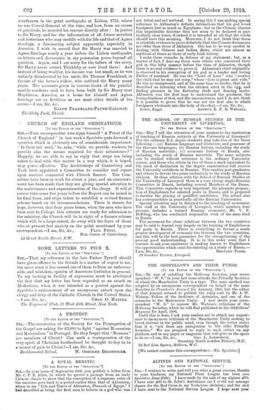A ROYAL HERETIC.
[To THE EDITOR OF THE " SPECTATOR."] Sin,—In your issue of September 24th you publish a letter from Mr. C. F. It. Allen, in which he quotes a passage from an early Chinese classic to show that the conception of a supreme ruler of the universe goes back to a period earlier than that of Akhnaton, whom in my "Life and Times of Akhnaton, Pharaoh of Egypt," I bad described as being the first man to believe in a god who was not tribal and not national. In saying this I was making special reference to Akhnaton's definite intimations that his god loved foreigners just as much as Egyptians; but in the Chinese classics this unpalatable doctrine does not seem to be declared in par- ticularly clear tones, if indeed it is intended at all that the word& should have this meaning. Moreover, I do not think that there is scientific evidence to prove definitely that the Chinese documents are older than those of Akhnaton. One has to be very careful in. dealing with Chinese and Indian dates, which are almost as mythical at times as those of early Irish history.
I make these remarks in defence of my statement; but, as a. matter of fact, I dare say there were others who conceived their god in this lofty manner before the time of Akhnaton, though there is no real evidence to prove it. Akhnaton's chief originality- is observed in his conception of his god as a tender and loving Father of mankind. He was the "Lord of Love" who "soothes the child that he may not weep," whose "love is great and wide.", He was so omnipresent, and at the same time so tender, that he is' described as listening when the chicken cried in the egg, and finding pleasure in the fluttering birds and dancing lambs. Akhnaton was the first man to understand the goodness, the, loving-kindness of God, and His unremoteness, and I do not think it is possible to prove that he was not the first also to admit foreigners wholesale into the body of the elect.—I am, Sir, &c.,














































 Previous page
Previous page